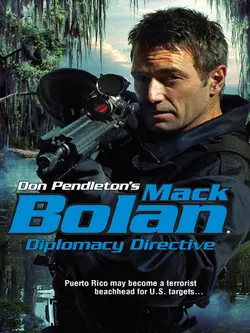Diplomacy Directive

Don Pendleton
Тип: электронная книга
Жанр: Современная зарубежная литература
Язык: на английском языке
Стоимость: 458.46 ₽
Статус: В продаже
Издательство: HarperCollins
Дата публикации: 16.04.2024
Отзывы: Пока нет Добавить отзыв
О книге: Blood and death mark a political rally in Puerto Rico on the eve of an election, putting U.S. interests in jeopardy. Mack Bolan′s mission: identify the unknown aggressors suspected of being a violent guerrilla unit demanding independence.But links to the presence of a Middle East terrorist cell compel Bolan to consider the worst-case scenario: enemies of the West want a free and independent Puerto Rico as a strategic stronghold for strikes against the United States. The brutal business of justice leads Bolan and a select team to a secret terrorist base on American soil, deep in the Georgia swamplands. Bolan′s singular objective: the eradication of those committing acts of barbarism against the free world.